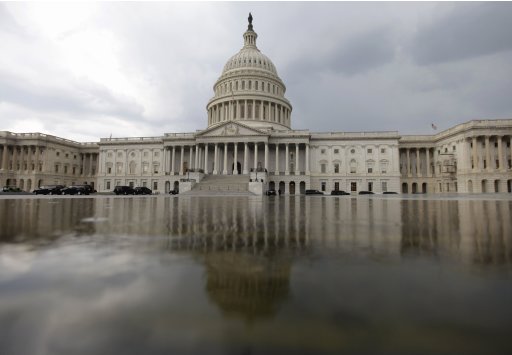
Senate Democratic leaders said Wednesday they, too, will have to go back and rewrite their debt-increase plan, meaning that with just six days to go until the government bumps up against its borrowing limit there is no viable plan pending in either chamber.
House Republicans on Tuesday pulled their own plan from the schedule after the Congressional Budget Office said it cut spending by $50 billion less than it increased the debt — violating a pledge the GOP’s leaders had made to match increases dollar-for-dollar with new cuts.
On Wednesday Senate Democrats had to follow suit Wednesday after CBO said their plan fell $500 billion short of their own debt increase.
Senate Majority Leader Harry Reid, the Nevada Democrat who wrote his party’s bill, said it will only need some “tweaking” to close the half-trillion dollar gap between his debt increase and his spending reductions.
“With CBO we always give them something to look at, and rarely is the first time through what we wind up with,” he said.
All sides are racing an Aug. 2 deadline, which is when the Treasury Department says the government will bump up against the $14.29 trillion borrowing ceiling written into law.
Republicans are seeking to win deep spending cuts in exchange for raising the debt, and Democrats have as of late joined them in that mission. But the two sides disagree over how much new debt authority should be granted.
Democrats want a $2.7 trillion increase, which would last past the 2012 election and ensure lawmakers don’t have to face the issue again before they face voters.
The GOP, though, wants a two-step process: an initial increase that would last into next year, and then another increase if a proposed special committee came up with more spending cuts or tax increases.
All sides have agreed to the GOP’s demand that a debt increase be matched by spending cuts.
CBO said Democrats’ bill would lower future spending by $2.2 trillion, chiefly by capping discretionary spending and limiting the amount of money spent on the wars in Iraq and Afghanistan. That falls $500 billion short of the $2.7 trillion debt increase in their bill.
Meanwhile, the House GOP’s bill would reduce future discretionary spending by $850 billion, which is $50 billion short of its debt increase and $150 billion short of leaders’ goal of cutting at least $1 trillion.
Both sides are seeking to be the last bill standing.
House Speaker John A. Boehner, Ohio Republican, argues that if the House will pass his bill, it will have momentum to pass the Senate. A vote was supposed to happen Wednesday but got put off when he realized he would need to rewrite the measure.
Mr. Reid rejected Mr. Boehner’s logic, saying no Senate Democrat will vote for the GOP version.
But Mr. Reid has delayed scheduling a Senate vote on his own proposal, apparently hoping that if Mr. Boehner’s bill fails his will be the only one left and thus would have momentum.
Republicans argue that much of Mr. Reid’s savings are illusory because they count on savings that would have happened anyway — chiefly from winding down the wars in Iraq and Afghanistan.
“For too long Washington has pulled the wool over the eyes of the American people — but those days are over. We have made a promise to cut spending more than we increase the debt limit, and we are revising our legislation to ensure this pledge is met,” said Michael Steel, a spokesman for Mr. Boehner.

No comments :
Post a Comment